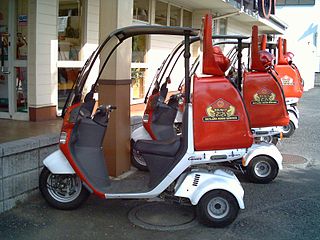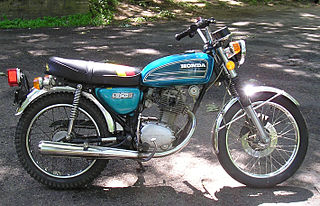
The Honda Hawk GT (NT650) motorcycle was designated as model RC31 and was designed by Toshiaki Kishi, and was the second Honda bike with "Pro-Arm" suspension after the RC30 VFR750R.

The Honda Magna is a cruiser motorcycle made from 1982 to 1988 and 1994 to 2003 and was the second Honda to use their new V4 engine shared with the VF750S Sabre and a few years later a related engine was fitted to the VF750F 'Interceptor', the later models used a retuned engine from the VFR750F with fins added to the outside of the engine. The engine technology and layout was a descendant of Honda's racing V4 machines, such as the NS750 and NR750. The introduction of this engine on the Magna and the Sabre in 1982, was a milestone in the evolution of motorcycles that would culminate in 1983 with the introduction of the Interceptor V4. The V45's performance is comparable to that of Valkyries and Honda's 1800 cc V-twin cruisers. However, its mix of performance, reliability, and refinement was overshadowed by the more powerful 1,098 cc "V65" Magna in 1983.
Triumph Engineering Co Ltd was a British motorcycle manufacturing company, based originally in Coventry and then in Meriden. A new company, Triumph Motorcycles Ltd, based in Hinckley, gained the name rights after the end of the company in the 1980s and is now one of the world's major motorcycle manufacturers.

The CB Series is an extensive line of Honda motorcycles. Most CB models are road-going motorcycles for commuting and cruising. The smaller CB models are also popular for vintage motorcycle racing. The related Honda CBR series are sport bikes.

The Honda CB750 is an air-cooled, transverse, in-line-four-cylinder-engine motorcycle made by Honda over several generations for year models 1969–2008 with an upright, or standard, riding posture. It is often called the original Universal Japanese Motorcycle (UJM) and also is regarded as the first motorcycle to be called a "superbike".

The Honda Shadow refers to a family of cruiser-type motorcycles made by Honda since 1983. The Shadow line features motorcycles with a liquid-cooled 45 or 52-degree V-twin engine ranging from 125 to 1,100 cc engine displacement. The 250 cc Honda Rebel is associated with the Shadow line in certain markets.

The Honda Gold Wing is a series of touring motorcycles manufactured by Honda. Gold Wings feature shaft drive and a flat engine. Characterized by press in September 1974 as "The world's biggest motor cycle manufacturer's first attack on the over-750cc capacity market...", it was introduced at the Cologne Motorcycle Show in October 1974.

The Isuzu Gemini is a subcompact car produced by the Japanese automaker Isuzu from 1974 until 2000. The same basic product was built and/or sold under several other names, sometimes by other General Motors brands, in various markets around the world. While the first generation was of a rear-wheel drive design, later versions were all front-wheel-drive, and the last two generations were no more than badge-engineered Honda Domani until the name was retired in 2000.

The Honda CX series motorcycles, including the GL500 and GL650 Silver Wing variants, were developed and released by Honda in the late 1970s, with production ending in most markets by the mid-1980s. The design included innovative features and technologies that were uncommon or unused at the time such as liquid cooling, electric-only starting, low-maintenance shaft drive, modular wheels, and dual CV-type carburetors that were tuned for reduced emissions. The electronic ignition system was separate from the rest of the electrical system, but the motorcycle could only be started via the start button.

The CBX750, or RC17 is a Honda motorcycle sold primarily in Europe, South Africa and Australia. Manufactured from 1984 to 1988, the CBX750 was developed from the CB750 while sharing technological data and certain componentry from the VF/VFR Series, which its development ran in parallel; hence the X in CBX being an acronym for City Bike eXperimental.

The CB700SC Nighthawk 700S is a carbureted, air-cooled, in-line four-cylinder motorcycle marketed by Honda solely in the United States for model years 1984–1986, with a standard or neutral, upright riding position, It was a downsized version of the CB750SC Nighthawk S and was meant to circumvent the tariff laws of 1983-1987. Features included a 6-speed transmission, hydraulic valve lifters, shaft drive, front bikini fairing, gear indicator, 16" wheels and an introductory list price of $3,398.

The Honda Gyro is a family of small, three-wheeled motorcycles sold primarily in Japan, and often used for delivery or express service.

The Honda VTX series is a line of V-twin Honda cruiser motorcycles inspired by the Zodia concept shown at the 1995 Tokyo Motor Show. The Honda VTX 1800 was launched in 2001 as a 2002 model. At the time this bike was introduced the Honda VTX engine was the largest displacement production V-twin in the world, but that distinction would be short-lived as the VTX1800 was superseded in 2004 by the 2.0-litre Kawasaki Vulcan 2000. Nevertheless, the VTX 1800 still produced better 0-60 mph and 1/4 mile times.

The first-generation Honda City was a subcompact hatchback produced by Japanese automaker Honda and aimed mainly at the Japanese domestic market. Referred to as having a "Tall Boy" body style by Honda, it was available in a number of versions, some of which were sold abroad.

The Honda Sabre was a motorcycle made by Honda from 1982 to 1985. Two years of the Sabre production run were part of a group of Japanese motorcycles that came to be known as "tariff-busters". The 1984 and 1985 models fell in this class because of the modifications made allowing those models to circumvent the newly passed United States International Trade Commission tariff that placed a heavy tax on import/foreign motorcycles with 700cc or larger engine displacement.

The Suzuki Boulevard S40 is a lightweight cruiser motorcycle manufactured by the Suzuki Motor Corporation for the Japanese domestic market, and exported to New Zealand, North America, as well as to Chile and other countries.

The Honda CB125 is a 122 cc (7.4 cu in) motorcycle made by Honda from 1971 to 1985. It had a single-cylinder overhead camshaft (OHC) engine with a 9500 rpm redline. The "S" model was produced from 1971 to 1975 and was replaced in 1976 by the "J" model. The newer model sported a two piece head, 124 cc (7.6 cu in) displacement, and a larger carburettor.

The Honda CB650 is a 627 cc (38.3 cu in) standard motorcycle produced from 1979 to 1985. It featured a four-cylinder, SOHC, air-cooled, wet sump engine, with two valves per cylinder. The CB650 was a development of the CB550, itself derived from the even earlier CB500. The CB650 was the last of Honda's successful series of air-cooled SOHC fours that began in 1969 with the Honda CB750.

The American Honda Motor Company, Inc. is the North American subsidiary of Japanese Honda Motor Company. Founded in 1959, the company combines product sales, service and coordinating functions of Honda in North America, and is responsible for distribution, marketing and sales of Honda and Acura brand automobiles, Honda Powersports products, Honda Power Equipment products, Honda Engines products, Honda Marine engines, and the HondaJet aircraft.

VT500 is a common name for the family of motorcycles sharing the Honda VT500 V-twin engine, with the cylinders set inline with the long-axis of the frame. Launched at the Cologne motorcycle show in September 1982, it was produced with various designations for different countries, such as Ascot, Shadow and Euro.



















